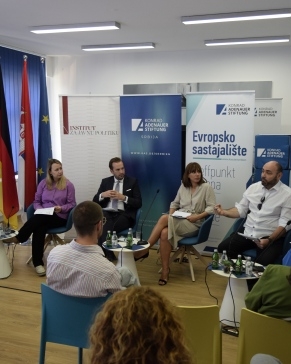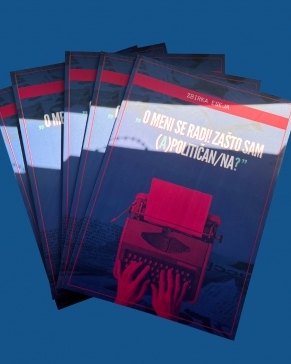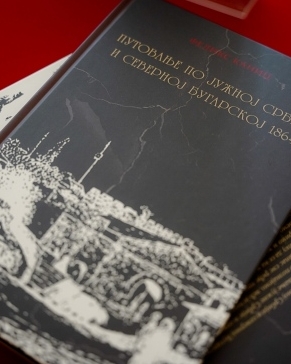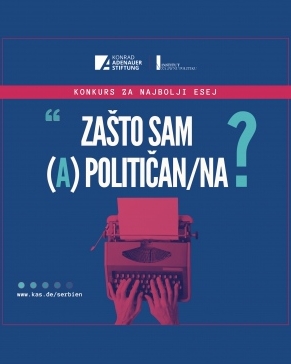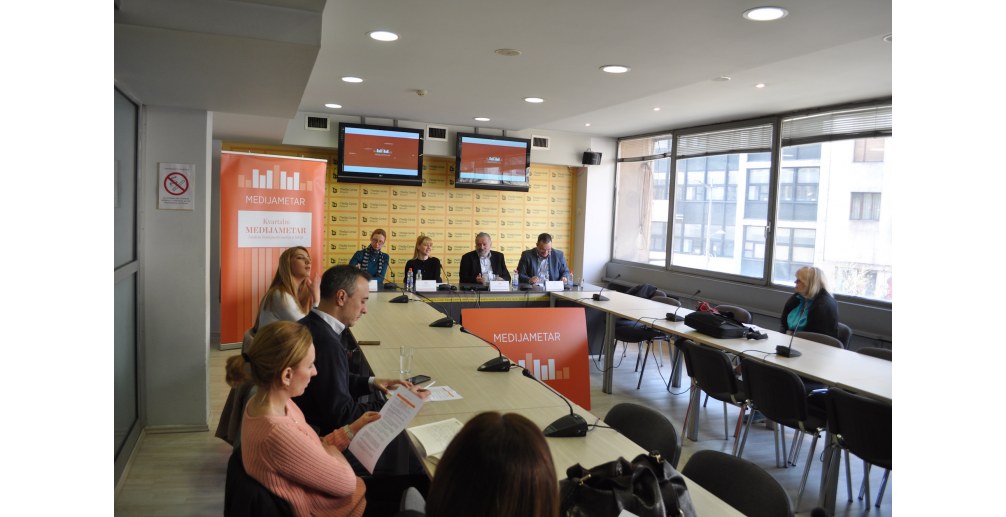
Fourth issue of “Quarterly Mediameter – Analysis of the print media in Serbia” was presented today at Media Center, Belgrade.
The lack of statistical data and facts regarding print media in Serbia has led to constant improvisation when referring to state of media, media freedom and editorial policy. Bearing in mind that no statistical data about media reporting existed in Serbia, Public Policy Institute, in cooperation with Media archive Ebart and experts who study this area, have started the project “Quarterly Mediameter – Analysis of the print media in Serbia” in early 2015.
Mediameter is a research and scientific-expert project, which monitors the development of the print media in Serbia through the analysis of value judgments and through the discourse analysis. Mediameter is aimed at improving the professional and ethical standards of media reporting and analysis. Experienced team in accordance with highest scientific standards makes methodology of research.
Mediameter’s results represent a database that could be used by all participants in public life. This report is a scientific analysis with the idea to stop the practice of arbitrary interpretation of media content.
Quarterly Mediameter is published four times per year. Three issues have been published so far, and they cover periods: January – March, April – June, July – September 2015. They are also available in electronic format on web page www.medijametar.rs
Fourth issue of Quarterly Mediameter, which covers the period October – December 2016, was presented today at Media Center, Belgrade. This issue covers articles from front pages of newspapers Politika, Večernje novosti, Blic, Danas, Kurir, Alo! and Informer. Discourse analysis covers weeklies Vreme, NIN, Novi Magazin, Nedeljnik, Newsweek and Pečat.
The results for whole 2015 have been presented at the press conference. Total sample is comprised of 7382 texts from front pages. Results are presented in 524 tables, which show distribution of topics and actors, their value context and frequency of occurrence.

Velimir Ćurgus Kazimir from Media archive Ebart said that print media in Serbia are deeply politicized and remarked that fewer texts have been written about the economy, European integration and relations in the region.
“We discover that our media are deeply politicized and that some topics demand greater attention – economy, relations with EU, EU integration, relations in the region are the missing topics. Even when agreement on accession process has been signed, some media, especially printed ones, choose to ignore that.”
“In this quarter (October – December 2015), Aleksandar Vučić is again the most represented actor with 717 appearances. An interesting development is that Ivica Dačić is now more represented that President of Serbia Tomislav Nikolić. Dačić is represented in 238 texts, while Nikolić features in 231 texts”, media analyst Danica Laban pointed out. She added that in the last quarter of 2015 24 positive and 23 negative texts were written about Prime Minister of Serbia.
“He is dominantly represented in neutral value context. The greatest number of texts was published in Politika, while the highest participation is in Kurir”, Laban said. She pointed out that the highest number of negative texts about Vučić is published in newspapers Danas (12 texts), while the highest number of positive is published in Alo! (9 texts).

Based on data from whole 2015, it can be concluded that media have rigid editorial policy. Similar topics were present on front pages throughout 2015, among which political life in Serbia occupies the largest share.
It can also be concluded that the majority of analyzed texts is unbalanced, which is contrary to moral and professional standards. Those texts are based on opinion of one interviewee or on opinions of several interviewees who share the same attitude. The greatest number of unbalanced texts is in newspapers Informer (92.10%), while the lowest number is in Danas (49.24%).
A curiosity is the fact that a newspaper Politika has 82.31% unbalanced texts in 2015, which represents greater percentage to those compared to tabloid Alo! (80.64%).
A common feature of attitudes towards all political actors, regardless whether they are opposition or government, is their contestation and emphasizing of their flaws. The greatest number of negative texts among members of Government of Serbia in 2015 is dedicated to Srđan Verbić (20.79%), while the lowest percentage belongs to Aleksandar Antić (1.06%).
Situation is similar in regard to leaders of opposition. Thus, the lowest number of negative texts is written on Sanda Rašković-Ivić (1.19%), while on the opposite side of spectrum is Čedomir Jovanović with 22.22% of negative texts.
Negativity trend is also noticeable in reports about regional relations: public is constantly reminded on conflicts and unresolved issues. Therefore, even 48.60% of texts about region has negative context.
The situation is not better regarding reports on EU. Despite the accelerated process of EU integration, a worryingly small number of texts on EU (only 212) has been published, and more than half – 51.42% – of them are negative.
Dejan Vuk Stanković, political analyst, said that there exists freedom of opinion, which produces pluralism of political views and values. Pointing out that, besides seven daily newspapers, Mediameter analyzes weeklies as well, Stanković said that they mainly criticize the government, and that they are differentiated by foreign policy values: 1) pro-European, critical of government, especially Prime Minister - Vreme, NIN 2) moderately critical and pro-European Nedeljnik and Novi magazin 3) radically Eurosceptic and pro-Russian – Pečat.
Stanković added that the image of Government and Prime Minister is negative in weeklies, while the opposition is presented as weak, with a lack of moral credibility.

